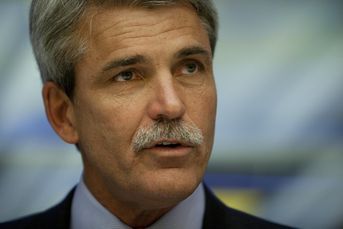All for one
Bring on the fiduciary standard. In a recent InvestmentNews survey of almost 600 advisers, registered reps, financial planners, insurance agents and others, 69.2% said that they agree with the SEC's staff recommendation that any financial professional giving personalized investment advice be deemed a fiduciary
Bring on the fiduciary standard. In a recent InvestmentNews survey of almost 600 advisers, registered reps, financial planners, insurance agents and others, 69.2% said that they agree with the SEC’s staff recommendation that any financial professional giving personalized investment advice be deemed a fiduciary.
What’s more, a strong majority wants a true self-regulatory organization — and not the SEC — to oversee financial advisers, according to the survey.
In fact, 78% who responded said they would designate one or more SROs to oversee investment advisers, or give the Financial Industry Regulatory Authority Inc. the authority to regulate dually registered firms.
Only 22% said they would authorize the SEC to create user fees on advisers to fund examination and enforcement efforts.
The issue of whether brokers and insurance agents will operate as fiduciaries is front and center in the minds of brokerage executives and compliance attorneys. Implementing a universal fiduciary standard of care is fraught with problems, particularly as the SEC is strapped for cash and lacks the staff to create a rigorous series of exams for advisers.
Last month, the SEC released a report that calls for brokers and advisers to be held to a uniform fiduciary standard. Right now, advisers conform to the fiduciary standard, meaning they must act in their clients’ best interests. Brokers are subject to a lesser standard, which requires them to recommend only those investments that are suitable for the clients. The SEC also has proposed ways of strengthening the regulation of financial advisers, one of which is to designate Finra as the SRO for some investment advisers.
Some advisers are adamant about the issue. “Whoever is involved in giving advice to clients needs to act in the client’s best interest,” regardless of how they are paid, said Steve Glaeser, a senior regional leader with PFS Investments Inc., a unit of Primerica Finance Corp.
PRODUCT PUSHERS
Too often, an industry professional gives financial advice that winds up “lining his own pockets, and that’s not right,” Mr. Glaeser said. That occurs “more in the insurance line, and more often by people who are only licensed to sell insurance,” he said.
Indeed, insurance agents, whom registered reps and investment advisers often hold in low regard as product pushers, did not fare well in the survey. Almost 83% of the respondents said that insurance agents who are also registered reps should be subject to a fiduciary standard.
“My sense is that there’s a recognition that a universal fiduciary standard of care is coming, and coming soon,” said David Bellaire, general counsel and director of government affairs at the Financial Services Institute Inc., a lobbying group that represents independent broker-dealers and reps.
NO SURPRISE
He said it is not surprising that the support for paying a user fee to the SEC ranked behind the other options to strengthen regulation and oversight of financial advisers. The SEC has a full plate of issues to deal with, Mr. Bellaire said.
“The SEC is not funded to hire the 2,000 examiners commissioner Walters wants to match Finra’s oversight of broker-dealers,” he said. The FSI supports Finra as the SRO for investment advisers. Investment advisers are examined once a decade by the SEC, while broker-dealers, depending on their size, are examined every year or every few years.
According to the survey, investment professionals are also hopeful that regulators eventually will take a position to retain 12(b)-1 fees, marketing fees that reps and advisers collect on sales of mutual funds.
Under the SEC’s current proposal, 12(b)-1 fees would be scrapped. Fund firms could charge marketing and service fees of up to 0.25%. Anything above that amount would be deemed an “ongoing sales charge,” which would be limited to the highest fee charged by the fund for shares without those types of fees.
The investment industry recently applauded the appointment of Eileen Rominger, a former chief investment officer at The Goldman Sachs Group Inc., as the SEC’s director of investment management. The industry believes she may take a stance more favorable to it on regulatory issues such as 12(b)-1 fees.
In the survey, more than 53% said that the SEC will issue a new proposal friendlier to the mutual fund and brokerage industries, and retain 12(b)-1 fees.
Also, investment professionals retain a negative perception of President Barack Obama, despite his recent efforts to meet with business groups such as the U.S. Chamber of Commerce.
Almost 44% of the respondents said that their perception of the job he has done over the past six months has worsened, while only 17% said it has improved.
E-mail Bruce Kelly at [email protected].
Learn more about reprints and licensing for this article.








